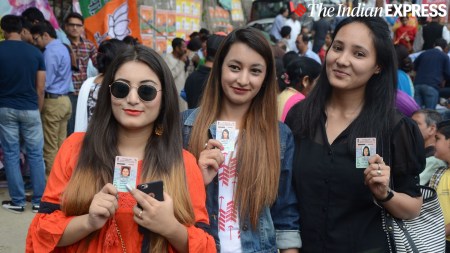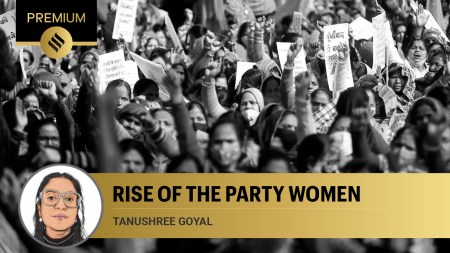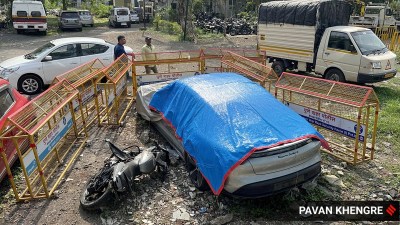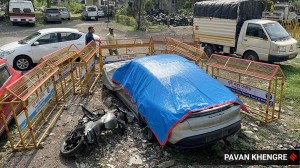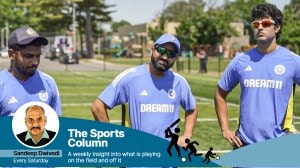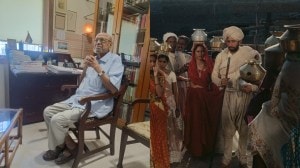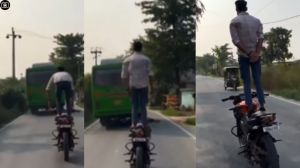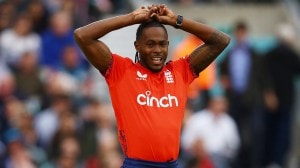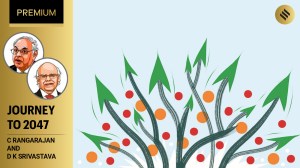- India
- International
Jaswant Singh: The courteous scholar-politician who was often out of sync with his party
Singh’s biggest supporter in the BJP was Atal Bihari Vajpayee, who recognised his worth.
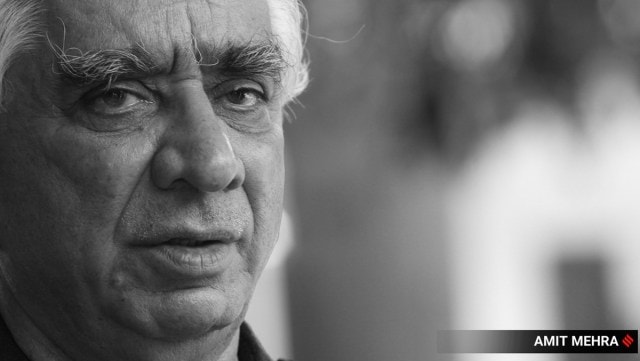 Jaswant Singh died after a cardiac arrest at the Army Hospital. (Express Photo by Amit Mehra/File)
Jaswant Singh died after a cardiac arrest at the Army Hospital. (Express Photo by Amit Mehra/File) Jaswant Singh, 82, was always somewhat of a misfit in the BJP, a party he helped found in 1980, and which he ably represented as a nine-time parliamentarian and Minister with key portfolios in the Vajpayee years between 1998 and 2004.
But the former Army Major with his liberalism, courteous old world military mannerisms, his interest in books and scholarship, and his outspokenness, was often out of sync with many in his party – the reason he was twice expelled from the BJP.
At the time of his death, Singh was no longer in the party, but the tributes paid to him by Prime Minister Narendra Modi and Defence Minister Rajnath Singh, who were partly responsible for his removal in 2014, indicated that despite differences, the BJP’s top leadership appreciated his valuable contributions to the party.
Singh’s biggest supporter in the BJP was Atal Bihari Vajpayee, who recognised his worth. During Vajpayee’s two tenures as Prime Minister, Singh was given important responsibilities that included holding, at different points of time, the three major portfolios of Finance, External Affairs and Defence.
But even Vajpayee could not always protect Singh. When Vajpayee took oath in 1999, Singh was included in the original Cabinet list as Finance Minister. But in a midnight coup, then RSS chief K S Sudarshan ensured that his name was omitted, reportedly at the behest of a top industrialist who was suspicious of Singh’s long-time friendship with businessman Nusli Wadia.

Within months, however, Singh was appointed External Affairs Minister. He displayed his obvious flair for diplomacy in helping mend bridges with the United States, which had slapped sanctions on India in the wake of the nuclear tests. Singh was engaged in regular talks with Strobe Talbott, the US Deputy Secretary of State. They met 14 times at 10 different locations, and Talbott was to concede that Singh beat him hands down in diplomatic manoeuvres.
Soon, US President Bill Clinton agreed to visit India, ending the downturn in the relations between the two countries. Talbott felt that India could not concede to the US as much as Singh wanted, because he was isolated in the Cabinet, and lost out to Brajesh Mishra and L K Advani.
Despite Kargil, Singh, in a view that differed from most in the government other than the Prime Minister, believed fervently in the importance of continued dialogue with Pakistan. Even after General Pervez Musharraf’s visit to Agra for peace talks ended in fiasco, Singh was not discouraged, and insisted that though the road might be long, the destination would eventually be reached.
The low point in Singh’s tenure as External Affairs Minister was the hijacking of Indian Airlines flight IC 814 with 175 passengers to Kandahar, Afghanistan, by Pakistan-backed terrorists. The Vajpayee government conceded the demands of the hijackers, and Singh personally escorted Masood Azhar, who would later mastermind several terrorist attacks against India, and two others who were let out of Indian jails, to Afghanistan. In return, the hijacked passengers were returned unharmed.
If Singh was eventually moved from External Affairs to the Finance Ministry in 2002, it was partly because of the increasing tensions between him and Vajpayee’s principal secretary Brajesh Mishra, a former IFS officer. As Finance Minister, Singh helped put in place market-friendly reforms. He also took over as Defence Minister when George Fernandes had to step down temporarily over the Tehelka allegations.
From 2004 to 2009, Singh was Leader of Opposition in Rajya Sabha, and acquitted himself as an outstanding parliamentarian both in debates and as leader of various parliamentary committees, including the Public Accounts Committee.
After the 2009 Lok Sabha polls, when the Congress returned to power and the BJP under L K Advani was once again soundly defeated, Singh along with Arun Shourie and Yashwant Sinha, was outspoken enough to ask for introspection by the party leadership. In the hierarchical party structure, this did not go down well, and he was soon persona non grata. Especially as a few months later he released his book, Jinnah: India-Partition-Independence. None of his party colleagues attended the release because they had an inkling of what was coming. In the book, Singh blamed Nehru and Patel for Partition, for accepting the “fallacious notion that Muslims are a separate nation and permitted the nation to be dissected”. In contrast, he eulogized Jinnah. Not surprisingly, he was expelled from the party.
Nitin Gadkari as party president reinstated Singh, who had won the Lok Sabha elections from Darjeeling in West Bengal in two consecutive elections with the help of the Gorkha separatists. But his return was short-lived.
Before the 2014 election, Singh was once again on a collision course with the BJP. He had fallen out with Vasundhara Raje, Chief Minister of Rajasthan, though ironically he had been extremely close to the Scindia family for years, and it was his brother-in-law Sardar Angre, who had persuaded Rajmata Vijayaraje Scindia to join the BJP. Vasundhara refused to allow Singh to stand from the Barmer constituency, where his home village Jasol is located. The 76-year-old Singh announced defiantly that he would contest anyway as an independent.
The party’s top brass, now led by Narendra Modi, expelled him once again. And Vasundhara made it her mission to ensure his defeat, calling BJP leaders from all over to campaign against Singh. She put up a Congress rebel, Colonel Sonaram Chowdhary, against him. Singh hit back at the new dispensation in the party led by Modi, remarking that their attitude reminded him of 1975 – arrogant, and with no interest in taking everyone on board. His son Manvendra Singh eventually joined the Congress.
Shortly after his defeat, Singh slipped and fell in the bathroom of his government bungalow on Teen Murti Marg, and suffered a major head concussion. He was rushed to the Army hospital, where he remained in a coma until Sunday morning, when he died after multiple organ failure.
Singh was born into a leading Rathore clan in Jasol, Barmer, which was connected with the many erstwhile royal families of Rajasthan. He joined the Army, and was among the first graduates from the National Defence Academy. He took part in the 1962 and 1965 wars against China and Pakistan, but left the Army in 1966. He worked for a while as the private secretary of the erstwhile maharaja of Jodhpur, Gaj Singh, and later joined the Swantantra Party.
He was bitterly anti-Congress, which he saw as the party that had deprived the erstwhile princes of their rightful dues by taking away their privy purses. At heart he always remained a bit of a royalist, and officers in North Block recall that the only Chief Minister he escorted courteously all the way to his car as Finance Minister was Amarinder Singh, out of respect for his royal title.
During the Emergency, he came close to Jana Sangh leaders such as Vajpayee and Advani. In 1980, he joined the nascent Bharatiya Janata Party, and was subsequently sent to Rajya Sabha. He was a member of Rajya Sabha for five terms and won four elections to Lok Sabha. His scholarship and varied interests are reflected in the fact that he also had the time to write more than half a dozen books.
Buzzing Now
Jun 01: Latest News
- 01
- 02
- 03
- 04
- 05



